

| |
 |
CSD11 Highlights,
Thursday, May 8th
aaa
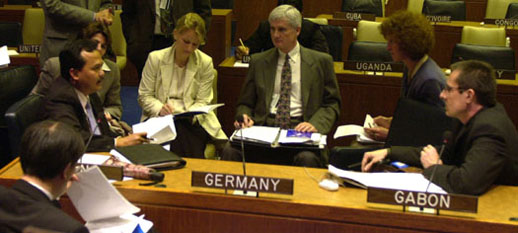
Delegates
convened briefly in the afternoon to discuss the draft preamble,
facilitated by Indonesia |

Delegates convened
in a Plenary in the afternoon for a briefing on the status of negotiations
on the draft decision on the future programme, organization and methods
of work of the Commission. They also met throughout the day and into
the evening in two parallel working groups to finalize negotiations
on their respective issues. Working Group I considered the CSD's multi-year
work programme and the future organization of work, with two contact
groups formed to negotiate issues concerning the Annex and the sequence
of meetings. Working Group II also established two contact groups
to finalize deliberations on reporting, Major Groups and SIDS, and
the UN systems, the Bureau, and partnerships. As of late Thursday
evening, negotiations were continuing on partnerships, the programme
of work, and the organization of work.
WORKING
GROUP 1
| This
working group convened in the morning to establish two contact
groups, which met throughout the day, and into the evening,
and which addressed the programme and organization of work.
FUTURE ORGANIZATION OF WORK: This contact group, chaired by
Richard Ballhorn (Canada), met in the morning, afternoon and
evening to negotiate elements in the future programme of work
relating to the purpose, outcomes and scheduling of meetings
in the multi-year cycle of work. Consensus
was reached on holding an Intergovernmental Preparatory Meeting
to discuss policy options and possible action, as well as to
prepare input for the “Policy Session.”
|
|
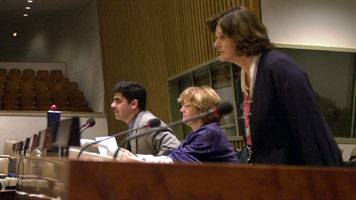
Photo (on far right):
JoAnne Disano Director, Division for Sustainable Development
|
|
|
PROGRAMME OF WORK: This contact
group, which was chaired by Hossein Moeini (Iran), took up the
Co-Chair's text distributed on Wednesday, and exchanged views
on: the general approach; number of themes in each cycle; criteria
for theme selection; the balance between focus and comprehensiveness
when selecting themes; linkages between themes; specific themes
for the first two cycles; and the special review cycle.
As of late Thursday evening, negotiations were ongoing.
|
|
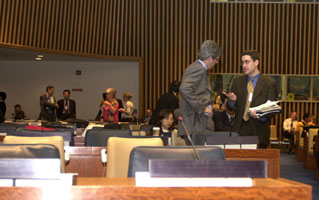
Delegates from the EU
& US
|
|
|
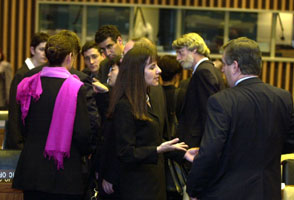
Delegates consulting after
the meeting
|
|
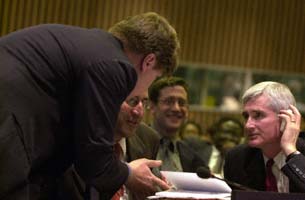
Andrey Vasiliev CSD Secretariat confers with US delegates |
|
|
|
WORKING
GROUP 2
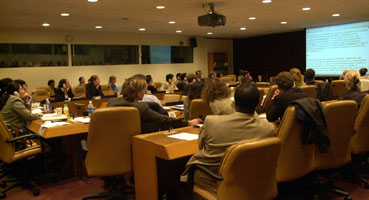
Delegates
in working group 2 consider the draft text
|
|
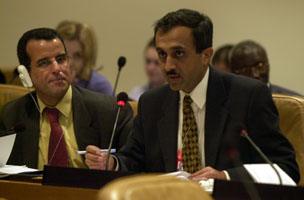
Delegate
from Pakistan
|
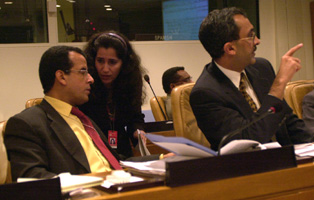
G77/China
|
|
Working
group II continued negotiating the Chair's draft decision,
and also took up draft decisions on NGO accreditation
and on SIDS, with the aim of completing work on all outstanding
decisions. While the group successfully completed much
of its work, by late Thursday evening a number of paragraphs
in the Chair's draft decision remained unresolved.
REPORTING: On a paragraph proposed by the G-77/CHINA encouraging
further work on indicators for sustainable development
by countries at the national level, delegates agreed to
use the exact language agreed in JPOI paragraph 130, which
notes the integration of gender aspects, the voluntary
basis of work, and national conditions and priorities.
|
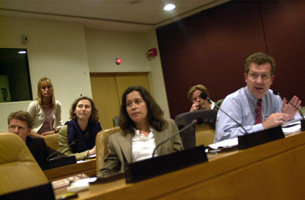
Delegates
from the European Union
|
|
MAJOR
GROUPS: Delegates discussed at length a paragraph deciding
to enhance contributions from Major Groups through a variety
of measures. The G-77/CHINA rejected additional proposals
by several other countries to refer to scientists, educators,
and other stakeholders.
After extensive discussions, a subparagraph promoting
more active involvement of Major Groups in implementation
was approved, with the inclusion of "other relevant
stakeholders," as proposed by the EU and AUSTRALIA.
However, as part of this agreement, the EU, US and others
acceded to a request by the G-77/CHINA to delete a paragraph
specifying constituencies/stakeholders, such as disabled
persons, consumer groups, educators, parliamentarians,
media, and the elderly.
|
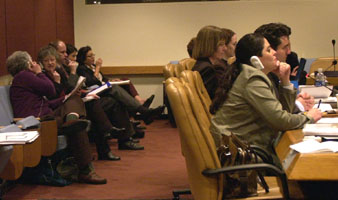
Working
group 2 Panel members
|
|
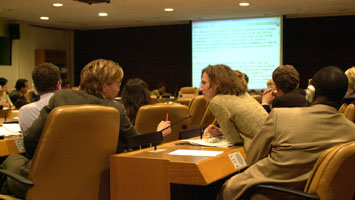
Working
group 2 participants at work
|
PLENARY
|
On
Thursday afternoon, delegates met in plenary to hear briefings
from the co-chairs of the working groups on the status
of negotiations. Noting progress made so far, CSD-11 Chair
Moosa urged participants to strive to conclude their work
on all outstanding paragraphs.
|
|
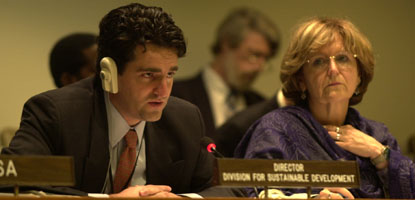
Photo
(left to right): Working Group 2 Co-chair Bruno Stagno
(Costa Rica); Working Group 1 Co-chair Nadine Gouzee (Belgium)
|
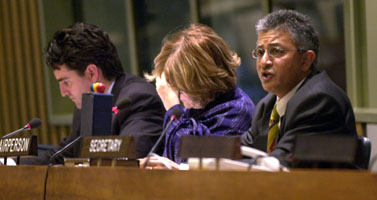 CSD 11 Chair Valli
Moosa (at right, in photo above)c
CSD 11 Chair Valli
Moosa (at right, in photo above)c
|
|
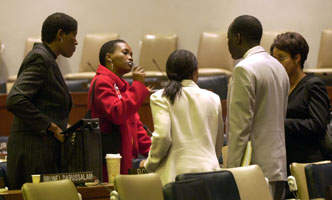
After
plenary, delegates formed groups to discuss specific issues |

Participants
in the plenary (last two at right, respectively): ENB's Kimo
Goree and Chris Spence
PARTNERSHIPS
FAIR
Partnership
for Clean Indoor Air

Photo
(left to right): Elissa Feldman, Associate Director, Indoor
Environments Division, EPA, Elizabeth Cotsworth, EPA,
and Brenda Doroski, EPA
|
|
|
|
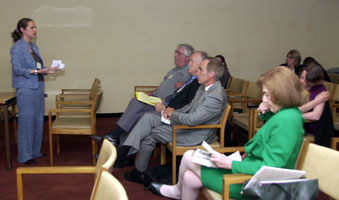
Elizabeth
Cotsworth, EPA, speaking to participants
|
|
This
partnership will address the serious health effects associated
with elevated indoor levels of smoke from cooking and heating
practices, and will bring together governments, industry and NGOs
to implement these efforts. The Partnership will aspire to halving
mortality related to indoor air pollution in targeted areas. Partners
will work together to: obtain formal commitments from, and develop
action plans with, key sectors; develop culturally appropriate
training and other public outreach materials; identify in-country
industry and other NGO partners to participate in implementation
activities; and identify lessons learned from past efforts. The
Partnership will focus on four core dimensions to the problem:
social/behavioral barriers; market development; technology design;
and health effects research. For more information, contact: Elissa
Feldman (feldman.elissa@epa.gov)
or Brenda Doroski (doroski.brenda@epa.gov)
|
| Transfrontier
Conservation Area and Tourism: Okavango Upper Zambezi International
Tourism Spatial Development Initiative
This partnership is lead
by SADC, and the Regional Tourism Organization for Southern
Africa (RETOSA), together with departments of tourism
and/or wildlife in participating partnership countries. The
Expanded OUZIT Project is an integrated tourism development
strategy aimed at establishing a comprehensive tourism and resource
development zone in SADC.
|
|
Partnerships
Fair Wrap Up
A
wrap up session for participants to express their views on the
Partnership Fair was held was facilitated by Federica Pietracci,
Secretariat. She said that 70 requests were received for the
Partnership Fair, while around 50 ended up making presentations,
as the partnerships had to either be existing or proposed to
be reviewed against the Bali Guiding Principles. Participants
were pleased that the Partnership Fair was organized for CSD-11.
Some of the recommendations for future partnership fairs included:
extending partnership events so that they do not all run in
parallel with negotiations, in order to allow for more government
participation; having displays in the corridors so delegates
could look around when having a cup of coffee or passing by;
having a clearer thematic focus, possibly with a high level
panel; making more time for informal discussions; and conveying
the information from the partnerships on the web, with power
point presentations, PDF files and summaries of events. One
participant suggested that for CSD-12 the first week could focus
on water projects. She also commented that of the partnerships
did not make enough of a link to the JPOI and the targets, which
the partnerships are trying to achieve.
|
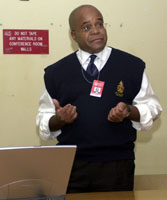
Photo: Ken Small, Development
Bank of Southern Africa
|
|
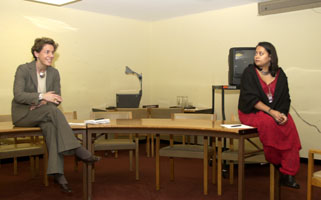
Facilitators
of the Partnerships Fair Wrap Up Federica
Pietracci (above left) and Mita Sen (above right), UN DESA |
| Global
Partnership for Capacity Building to Implement the Globally Harmonized
System for Chemical Classification and Labelling (GHS)-organized
by UNITAR, ILO and OECD The
goal of the WSSD GHS Partnership is to mobilize support and
catalyze partnerships for concrete activities at the global,
regional and national levels to strengthen capacities in developing
countries in transition towards effective implementation of
the GHS for industrial chemicals, agricultural chemicals, chemicals
in transport and consumer chemicals. In the medium- and long-term,
the Partnership is expected to lead to a decrease in environmental
and human health related effects attributable to the use of
hazardous chemicals. For more information, visit: www.unitar.org/cwm
|
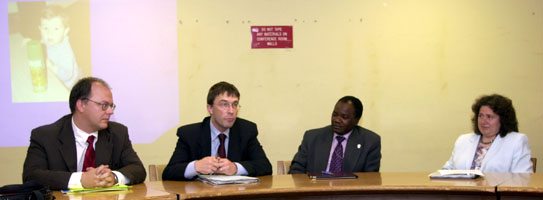 Photo
(left to right): Craig Boljkovac, Chemicals and Waste Management,
UNITAR, Franz Perrez, Switzerland, Mathias Daka, Zambia, and
Birgit Engelhardt, ICCA
Photo
(left to right): Craig Boljkovac, Chemicals and Waste Management,
UNITAR, Franz Perrez, Switzerland, Mathias Daka, Zambia, and
Birgit Engelhardt, ICCA
|
|
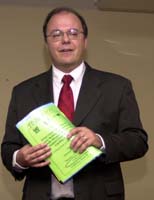
Craig
Boljkovac |
SIDE
EVENTS
Renewable
Energy Technology Diffusion -
a presentation organized by E7 and UNDESA
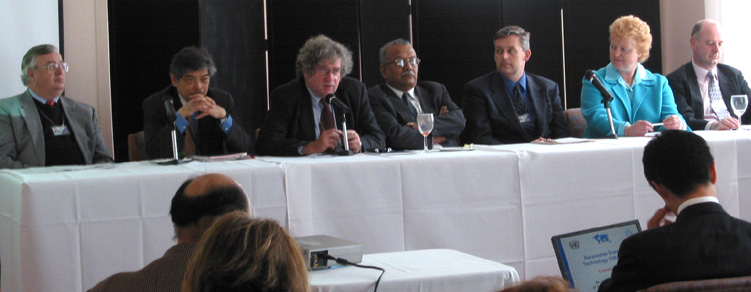
Photo
(panel participants, from left to right): John Harper, e7 Technology
Diffusion Working Group Chair; Kui-Nang Mak, Chief, Energy and Transport
Branch, UNDESA; Christian Stoffaes, Electricite de France; Nitin Desai,
United Nations Under-Secretay-General for Economic and Social Affairs;
Dale Heydlauff, e77 Sherpa Committee Chair; Helen Howes, Ontario Power
Generation; Andrew Mitchell, Scottish Power; John Easton, EEI


Click here to see more of today's photos
Links
to further information:
.
|
Any irregularities on this page? Please
mail the Digital Editor
| Linkages
home | Visit IISDnet | Send
e-mail to ENB |
© 2003, IISD. All rights reserved.
|

